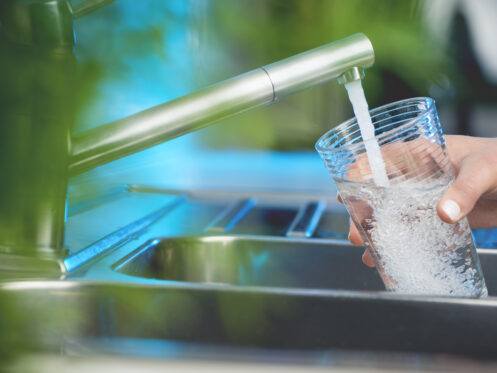Water plays a vital role in our everyday lives, serving as a fundamental necessity for hydration, cooking, cleaning and hygiene. Clean water is essential for staying healthy and happy. However, water quality concerns, such as contaminants and impurities, can impact its safety and taste. That’s why installing a water filtration system is such a good idea. A water filtration system ensures access to clean and safe water at all times. This investment provides peace of mind and promotes a healthier and more enjoyable daily life.
What Is Water Filtration?
Water filtration is a process that removes impurities and contaminants from water, making it cleaner and safer for consumption and various other purposes. These systems typically leverage physical, chemical or biological methods to eliminate particles, bacteria, chemicals and other pollutants from the water. They can range from simple pitcher filters to complex multi-stage filtration units.
UV Light
UV-light water filtration systems work by using ultraviolet (UV) radiation to disinfect and purify water. These systems typically consist of a UV lamp housed in a protective chamber through which water flows. As water passes by the UV lamp, the UV light penetrates the cells of microorganisms, such as bacteria, viruses and protozoa, disrupting their DNA and rendering them unable to reproduce or cause infections. While UV filtration doesn’t remove particles or chemicals from the water, it effectively destroys harmful microorganisms. These systems provide safe and clean drinking water without the need for chemical additives or altering the water’s taste or odor.
Sediment Filters
Sediment water filtration systems work by removing particles and debris from water. This helps it remain clean and free of visible contaminants. These systems use a filter cartridge or media bed designed to trap sediment as water passes through. As water flows, the filter captures the sediment, preventing it from reaching faucets, appliances and other points of use. Sediment filtration can range from simple mesh screens to more advanced sediment filters with various pore sizes to capture particles of different sizes.
Water Softeners
Ion exchange is the mechanism by which water softener systems remove hard water minerals, such as calcium and magnesium. Sodium-ion-charged resin beads attract the calcium and magnesium ions in the hard water as they travel through the bed, exchanging them for sodium ions. By lowering the mineral concentration, this method successfully makes the water softer.
Ceramic Filters
Ceramic water filtration systems use porous ceramic materials to effectively remove contaminants from water. They consist of a ceramic filter cartridge with microscopic pores that trap bacteria, protozoa and other particles as water passes through. The ceramic material acts as a physical barrier, blocking the passage of contaminants while allowing clean water to flow through. Some ceramic filters may also incorporate activated carbon or silver nanoparticles to enhance filtration efficiency and inhibit bacterial growth. Ceramic filtration is a cost-effective and sustainable method for improving water quality in areas with limited access to clean water.
Whole-House Filters
Whole-house water filtration systems work by treating all of the water entering a home. They make sure every faucet and appliance receives clean and filtered water. Most homes have these systems installed at the main water line, which is where water first enters the house. They consist of multiple stages of filtration: sediment filters, activated carbon filters and specialty filters designed to remove specific contaminants like chlorine, lead or bacteria.
Benefits of Water Filtration
Choosing the right water filtration system depends on a variety of variables. You have to take into account the system’s capacity, the home’s water quality and pressure and your preferred filtration method. To determine compatibility with your home, a plumber will consider the available space for installation, the home’s existing plumbing configuration and your water quality concerns. No matter the type you choose, you and your home will benefit in several ways.
Enjoy Better Tasting Water
Water filtration systems lead to better-tasting drinking water by removing impurities and contaminants that can affect its flavor. Common pollutants like chlorine, sulfur and sediment can impart off-flavors and odors to water, making it unpalatable. Filtration also helps balance mineral content, reducing the presence of substances that contribute to unpleasant tastes or odors.
Experience Healthier Water
Water filtration makes water healthier for drinking, bathing and cooking by removing harmful contaminants and impurities. Filtration also reduces the presence of chemicals like chlorine, lead and volatile organic compounds, which can have adverse health effects when ingested or absorbed through the skin during bathing. Filtered water is gentler on the skin and hair. It also increases the performance of soap and detergents.
Extend the Lifespan of Your Appliances
Sediment and minerals in water can accumulate in appliances like water heaters, dishwashers and washing machines, leading to clogs, corrosion and reduced efficiency over time. By removing these contaminants, filtration systems prevent scale buildup and corrosion, preserving the performance and efficiency of appliances. The cleaner water also reduces the need for harsh detergents and chemicals, which can contribute to wear and tear on appliance components. By extending the lifespan of appliances, homeowners save money on repairs and replacements.
No Need to Spend Money on Bottled Water
With a filtration system in place, you can enjoy unlimited access to high-quality drinking water straight from the tap. This eliminates the need to purchase single-use plastic bottles. It not only saves money but also reduces plastic waste and environmental pollution associated with bottled water production and disposal.
Easy Installation and Maintenance
Water filtration systems are easy to install and maintain, providing you with convenient access to clean water without extensive effort. Simple systems like faucet-mounted or pitcher filters require minimal installation, often involving attaching the filter to the faucet or placing it in a pitcher. Maintenance typically involves the regular replacement of filter cartridges or media to ensure continued effectiveness. More complex systems, such as whole-house filtration or reverse osmosis systems, may require professional installation. These systems generally have straightforward maintenance requirements, such as periodic filter replacements or system flushing. Generally, filter cartridges may last anywhere from three to six months, while media-based systems, such as reverse osmosis or whole-house filters, can last one to three years before requiring replacement. Regular maintenance and monitoring are essential to ensure optimal filtration performance.
Versatility Through Customization
Homeowners can tailor various filtration methods to target specific contaminants, such as sediment, chlorine, lead or bacteria. For instance, sediment filters remove particles, while activated carbon filters adsorb chlorine and organic compounds. Reverse osmosis systems effectively remove dissolved solids, including heavy metals and minerals. UV filters disinfect water by killing bacteria and viruses. By selecting and combining different filtration technologies, homeowners can create customized systems that meet their unique water quality needs.
If you need help choosing a water filtration system for your Beckley, WV, home, contact Childers Air Plumbing & Electric. We also provide heating and cooling services, electrical work, plumbing repairs and more. When you need reliable plumbing in West Virginia, Childers Air Plumbing & Electric is the place to call.

